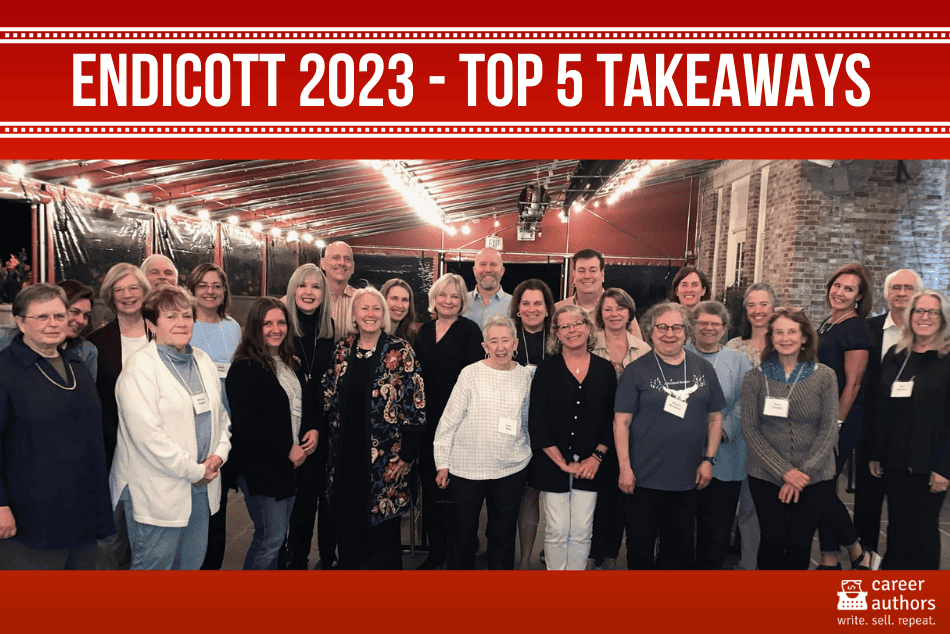by the Career Authors
We just wrapped up the 2023 Career Author’s Writer’s Retreat at the sensational MIT Endicott House in Boston. This years attendees definitely brought their A-game and were ready to roll their sleeves up and work hard on perfecting their first pages, log lines, and query letters! If you hoped to attend but couldn’t make it, we wanted to share the Top 5 Take Aways from the event:
HANK
(1) Find your story’s essence. What a wonderful and life-changing weekend! And I am profoundly affected by how many attendees leaped the chasm from “a maybe, sorta, perfectly good but unformed and amorphous idea for a story,” to creating a strong, focused log line. One of the most difficult parts of writing a novel is distilling your idea to its essence, and then crafting the log line that will guide you to writing your entire book. Yes, they are difficult to write, but so many were developed over this weekend! And no one left on Sunday without understanding their critical importance, and how the right one can propel your “maybe it’s a book” into a powerful reality.
PAULA
(2) Know your genre & position accordingly. Publishers are looking for the same, but different. Just like [insert bestseller here], only different [and you have to be able to articulate that difference.]. For my Mercy Carr series, it’s “Just like Julia Spencer-Fleming, only with dogs.” For The Martian, it’s “Just like Castaway, only on Mars.” For The Thursday Murder Club, it’s “Just like the movies Red and Red 2, only set at an assisted living facility.” You should know how to frame your work in “the same, but different” terms.
DANA
(3) Don’t over-explain. A book is a pile of papers or digital data until someone comes along, reads it, interprets it, and brings its story alive. A key question is how much description to include. Clarity is a must for writers, but that doesn’t mean your prose must hand absolutely everything over to them. Instead, let readers participate in the story.
Of course info dumps are to be avoided, but some authors go further and prefer sparer prose in general—that means less description on the page. These authors try to guide readers through their story while at the same time allowing them to imagine, filling in the empty spaces themselves. Do you try to control your readers’ imaginations, or do you try to inspire them?
Letting go can be challenging or unappealing to writers craving greater narrative control, but to some degree authors must respect and trust their readers.

JESSICA
(4) It’s good to have questions! I often see writers in workshops raise their hands looking sheepish or timid—but there’s never any need to apologize for being there to learn. In fact, writers who ask smart, targeted questions often make a stronger impression, because it’s evident that they have specific goals in mind, with a sense of what they still need to work on and a willingness to put in the time and effort to get it done.
BRIAN
(5) Opening Sentence: We’ve all heard the saying: “You never get a second chance to make a first impression.” This is true in business and relationships, but it’s also true on the page. The first sentence of a novel is how literary agents and acquisition editors “meet” your work. The amount of skill and effort an author puts into crafting that first sentence is proportional to the impact it makes on the reader.
A properly constructed opening sentence should introduce the novel’s protagonist and provide evocative information about the character, setting, and/or stakes that piques the reader’s interest. At this year’s conference, every attendee read their novel’s first page aloud and we paid special attention to the opening sentences. By the conference’s end, the opening sentences were rocking!
A FINAL WORD…
The goal of the Endicott Retreat is to provide each attendee with personalized attention, coaching, and constructive feedback to accelerate the path to publication. But the learning experience is a two-way street for all of us in Career Authors. At Endicott, we get refreshers and inspiration too. The all around feedback from this year was tremendous, so we hope you can join us next year!






